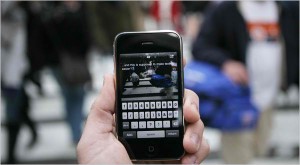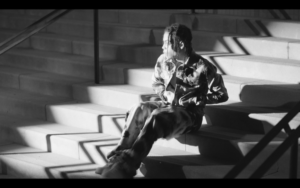I’m being social, by ignoring the people (and fountains) around me… so out of my way!
Walking consists of two major components: moving your feet and looking ahead. If you don’t move your feet, you stay in one place. This is called standing, or, in New York, tourism. If you don’t look ahead, you run into things, or things with the right of way run into you. This is called stupidity, or, in New York, stupidity. Over the last year and a half, many pedestrians on busy city sidewalks have decided that one major component of walking doesn’t matter anymore. Anybody care to guess which one?
When I unceremoniously left the job market in late 2008, most people still used regular cell phones. We made phone calls and sent text messages. We played that game in which a bouncing ball makes blocks disappear. Then we put the phones in our pockets and walked. We did one thing at a time, as our parents taught us, and we did it well. The trendsetters who walked among us while talking and texting were seen as oddities, and belittled mercilessly. Life was simpler then. Men held doors and tipped their hats. Women curtsied. People had, you know, jobs. Maybe I’m just remembering a New York that never was, like in a Meg Ryan movie on WE TV that you can’t turn off even though you’ve seen it 100 times, memorized all the funny parts, including the fake orgasm in Katz’s Deli, and find Billy Crystal’s hair really, really disturbing.
When I last left the employed ranks, smartphones had been around awhile. The first iPhone launched in early 2007; the first BlackBerry came along well before that. But they hadn’t gained critical mass. The fall of the economy somehow ushered in the age of the smartphone. It seems a little counter-intuitive on the face of it. Then again, what’s more American than spending money you don’t have? The smartphone also birthed a whole new breed of city pedestrian… the smartphone zombie. New York sidewalks are now overrun with reading, texting, emailing, surfing, tweeting, status-updating, app-using, video-watching, music-downloading, game-playing zombies who don’t look where they’re going.
 Today’s white collar worker is used to multitasking. We juggle email and IM and Word docs and Excel spreadsheets and countless other desktop applications designed to make us more efficient. It’s necessary and expected, even though constantly switching tasks has been shown to reduce productivity. The smartphone extends the workspace to a hand-held device and anywhere someone can take it. So multitasking logically carries over too. Arriving in one piece is no longer accomplishment enough. We must get things done en route. The world won’t wait, but it is expected to stop when a smartphone zombie weaves down the sidewalk and wanders out into traffic.
Today’s white collar worker is used to multitasking. We juggle email and IM and Word docs and Excel spreadsheets and countless other desktop applications designed to make us more efficient. It’s necessary and expected, even though constantly switching tasks has been shown to reduce productivity. The smartphone extends the workspace to a hand-held device and anywhere someone can take it. So multitasking logically carries over too. Arriving in one piece is no longer accomplishment enough. We must get things done en route. The world won’t wait, but it is expected to stop when a smartphone zombie weaves down the sidewalk and wanders out into traffic.
I’ve seen many smartphone zombies almost die and not even realize it. They step out in front of buses and cabs. They wait to cross the street, in the middle of the street. They ride bicycles against one-way traffic without looking. I’m perfectly okay with people self-selecting themselves out of the human race. Humanity is better off if the stupid gene doesn’t reproduce. I just don’t want to be involved. More to the point, I don’t want to be inconvenienced. Too bad it’s unavoidable.
Smartphone zombies get in the way. They’re attracted to high-traffic areas, such as doorways, sidewalks, subway platforms and the tops and bottoms of escalators. Eyes glazed over, they seem to lack any awareness of the world around them, or any interest in it. And they don’t seem to understand that someone else might need to pass through the space they occupy. Or they just don’t care. I routinely have to push smartphone zombies out of the way… zombies leaning on the front door of my apartment building, zombies blocking the exit of a retail establishment, zombies lounging by the subway escalator. And when I do, it’s somehow my fault.
Change being the only constant, I expected the world to be a different place when I returned to work. How could it not be? But I thought some basic things – like walking – would remain essentially the same. The New York sidewalk slalom was treacherous enough without the smartphone zombie swarms wandering about. Now, not only do I have to look out for myself, I have to look out for the other guy too… the guy who’s too busy harnessing technology to see the world around him.
– Norm Elrod is a freelance writer and digital media consultant. He blogs about his experiences in the job market at Jobless and Less.
.


